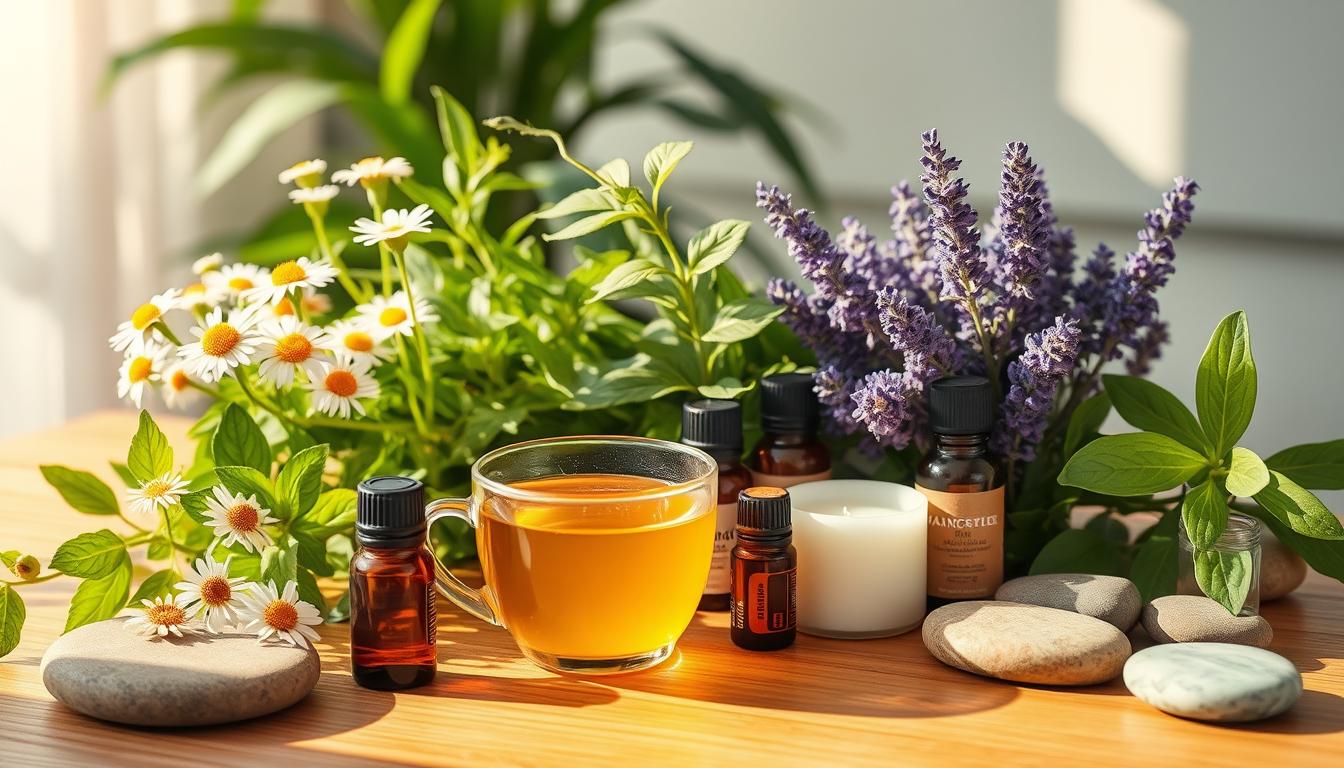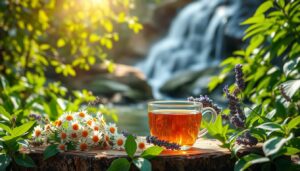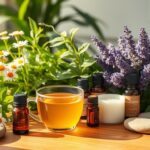In today’s fast-paced and often overwhelming world, many individuals are seeking natural and holistic solutions to manage their anxiety. Anxiety can significantly impact daily life, disrupting productivity, relationships, and overall well-being. However, there is hope, as nature itself offers a wealth of remedies to help alleviate the symptoms of anxiety and restore a sense of inner peace.
This comprehensive guide delves into the world of natural anxiety relief, exploring the most effective herbs, plants, essential oils, and lifestyle modifications that can help you reclaim your mental and emotional balance. Whether you’re seeking to manage occasional bouts of stress or grapple with persistent anxiety, the solutions presented in this article can empower you to feel calm, centered, and in control of your well-being.
Key Takeaways
- Discover the power of natural remedies to alleviate anxiety and promote inner calm
- Explore the science behind the effectiveness of holistic approaches to anxiety management
- Learn about the best essential oils and aromatherapy techniques for reducing stress and anxiety
- Understand the role of mindfulness, meditation, and dietary changes in combating anxiety
- Develop a comprehensive plan for long-term anxiety relief through lifestyle adjustments
Understanding Anxiety and Its Impact on Daily Life
Anxiety is a common mental health condition that affects millions of people worldwide. It manifests through a range of physical and psychological symptoms that can have a significant impact on daily life. Understanding the nature of anxiety and its scientific basis is crucial for developing effective, natural strategies for relief.
Physical and Mental Symptoms of Anxiety
Anxiety can present itself in various physical forms, such as rapid heartbeat, sweating, trembling, and muscle tension. Mentally, it can lead to excessive worry, difficulty concentrating, and feelings of restlessness or irritability. These symptoms can make it challenging to perform everyday tasks, maintain relationships, and enjoy a sense of overall well-being.
The Science Behind Natural Anxiety Relief
Research has shown that certain natural remedies, such as stress management techniques and specific dietary changes, can help alleviate anxiety symptoms. For instance, natural anti-anxiety foods like chamomile, lavender, and omega-3-rich foods have been found to have a calming effect on the body and mind. Similarly, stress management tips like deep breathing, meditation, and regular exercise can help regulate the body’s stress response and promote a greater sense of overall calmness.
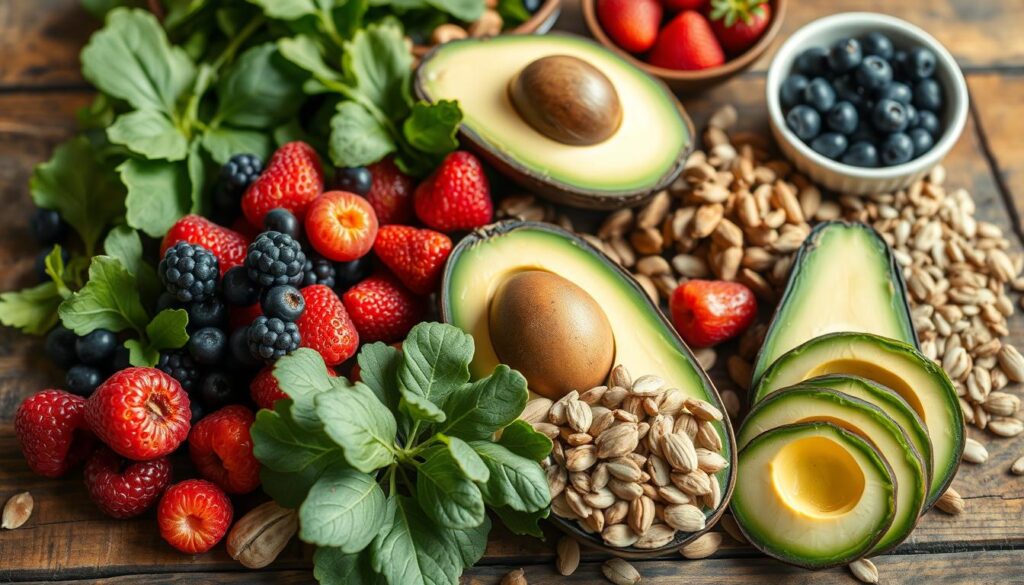
“Incorporating natural approaches to anxiety management can be a powerful way to reclaim control over one’s mental and physical well-being.”
By understanding the nuances of anxiety and the scientific principles behind natural remedies, individuals can take proactive steps towardsreducing stress, improving mood, and enhancing their overall quality of life.
Essential Herbs and Plants for Reducing Anxiety
Navigating the challenges of daily life can be daunting, but nature offers a soothing remedy in the form of herbal anxiety treatments and anxiety-reducing supplements. Explore the power of these natural wonders as we delve into the world of essential herbs and plants known for their calming properties.
One of the most renowned herbs for anxiety relief is chamomile. Its gentle, floral aroma has been used for centuries to promote relaxation and ease tension. Sipping a warm cup of chamomile tea can be a soothing ritual, allowing the mind to unwind and the body to find respite.
Another popular choice is lavender, renowned for its ability to calm the senses and alleviate feelings of stress. Whether diffused as an essential oil or incorporated into a soothing bath, the fragrance of lavender can transport you to a serene state of being.
- Passionflower, known for its ability to reduce anxiety and improve sleep quality.
- Valerian root, a natural sedative that can help ease anxiety and promote restful slumber.
- Lemon balm, a versatile herb that can help lower cortisol levels and alleviate symptoms of anxiety.
These are just a few of the herbal anxiety treatments and anxiety-reducing supplements that nature has to offer. Experiment with these natural remedies and find the ones that resonate most with your unique needs, allowing you to reclaim your sense of inner peace and tranquility.
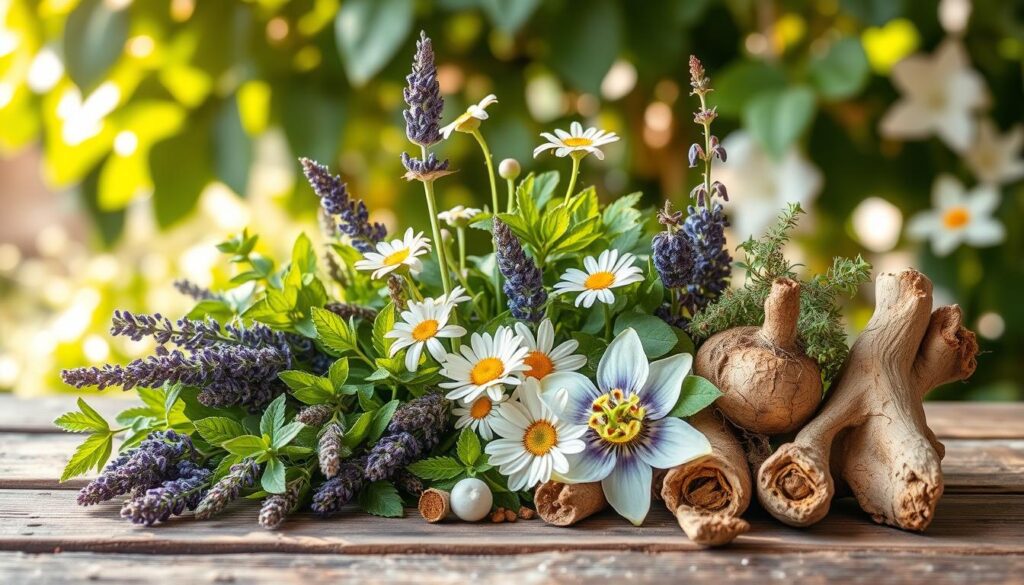
“The greatest weapon against stress is our ability to choose one thought over another.” – William James
| Herb | Benefits for Anxiety | How to Use |
|---|---|---|
| Chamomile | Promotes relaxation and reduces tension | Drink as tea or use as an essential oil |
| Lavender | Calms the senses and alleviates stress | Diffuse as an essential oil or add to a soothing bath |
| Passionflower | Reduces anxiety and improves sleep quality | Take as a supplement or use in tinctures |
The Power of Aromatherapy and Essential Oils for Calm
Unlock the profound potential of calming essential oils to alleviate anxiety and promote inner peace. Aromatherapy, the practice of using aromatic plant extracts, offers a natural and holistic approach to managing stress and cultivating a sense of calm in your daily life.
Best Essential Oils for Anxiety Management
Certain essential oils possess remarkable properties that can help soothe the mind and body. Some of the most effective natural remedies for anxiety relief include:
- Lavender oil: Known for its calming and sedative effects, lavender can help relieve tension and promote relaxation.
- Chamomile oil: With its anti-inflammatory and anti-anxiety properties, chamomile can ease mental and physical symptoms of anxiety.
- Bergamot oil: This citrusy essential oil can uplift the mood and reduce feelings of stress and worry.
- Ylang-ylang oil: Renowned for its calming and mood-balancing effects, ylang-ylang can help alleviate anxiety and promote inner harmony.
How to Use Essential Oils Effectively
To harness the power of calming essential oils, you can incorporate them into your daily routine in various ways:
- Diffuse the oils in an aromatherapy diffuser to fill the air with their soothing aromas.
- Apply a few drops of the oils to your temples, wrists, or the back of your neck for topical benefits.
- Add a few drops to a warm bath or massage them into your skin for a relaxing and nourishing experience.
Creating Calming Essential Oil Blends
Experiment with different essential oil combinations to create your own personalized blends that cater to your unique needs. For instance, you could mix lavender, bergamot, and ylang-ylang for a deeply calming and soothing experience. Explore the possibilities and find the perfect blend to support your natural remedies for anxiety relief.
“Aromatherapy is a gentle, natural way to promote emotional and physical well-being. Harnessing the power of calming essential oils can be a transformative experience.”
Natural Remedies for Anxiety Relief: A Comprehensive Guide
Seeking holistic anxiety relief can be a transformative journey towards inner peace and wellbeing. From the power of natural anti-anxiety foods to soothing aromatherapy, this comprehensive guide explores a range of effective remedies to help you overcome the challenges of anxiety and reclaim your mental health.
Harnessing the Healing Properties of Plants
Certain herbs and botanicals possess inherent calming properties that can work wonders for anxiety management. Consider incorporating these natural wonders into your self-care routine:
- Chamomile: Known for its soothing and anti-inflammatory effects, chamomile tea can help promote relaxation and alleviate tension.
- Lavender: The aromatic and therapeutic properties of lavender essential oil can induce a sense of tranquility and ease anxiety symptoms.
- Valerian Root: This versatile herb has been used for centuries to combat insomnia and reduce stress and anxiety levels.
The Power of Aromatherapy
Leveraging the power of essential oils can be a transformative way to achieve holistic anxiety relief. Certain scents have the ability to trigger the limbic system, the part of the brain responsible for emotional processing, and can have a profound calming effect on the mind and body.
| Essential Oil | Anxiety-Reducing Benefits |
|---|---|
| Bergamot | Uplifting and soothing, with a citrusy aroma that can alleviate tension and promote relaxation. |
| Ylang-Ylang | Known for its ability to lower blood pressure and heart rate, making it an excellent choice for managing anxiety. |
| Frankincense | This earthy, grounding scent can help quiet the mind and foster a sense of inner peace. |
By incorporating these natural remedies into your daily routine, you can embark on a holistic journey towards anxiety relief and reclaim your mental well-being.
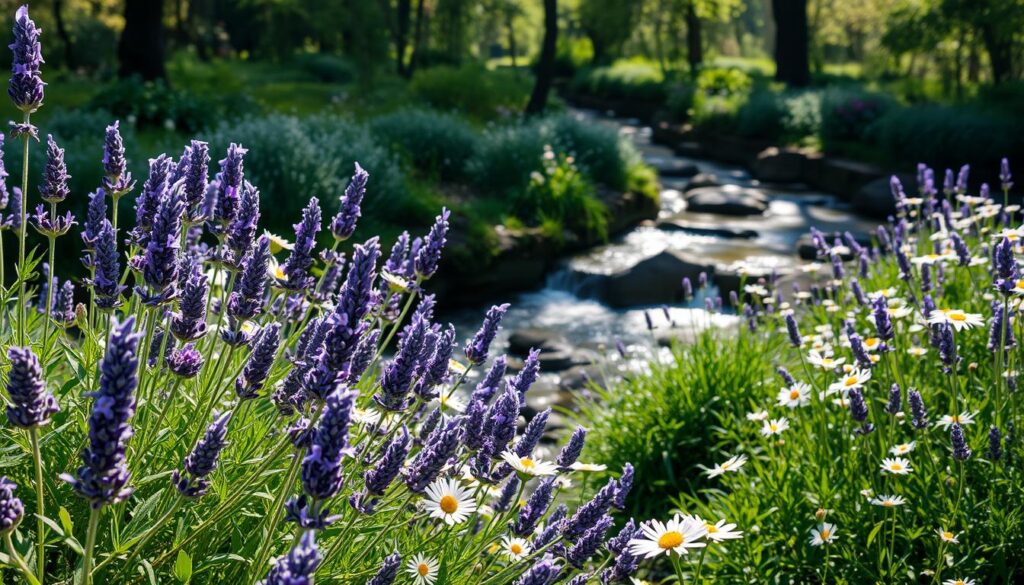
Mindfulness and Meditation Practices for Inner Peace
In the quest to manage anxiety and find inner tranquility, mindfulness and meditation practices have emerged as powerful tools. These time-honored techniques can help individuals cultivate a deeper connection with the present moment, reducing the grip of worry and restoring a sense of calm.
Getting Started with Mindfulness Meditation
Mindfulness meditation is a simple yet profound practice that involves focusing one’s attention on the breath, bodily sensations, or a specific object of attention. By learning to anchor the mind in the here and now, individuals can counteract the tendency to dwell on the past or obsess about the future, which often fuels anxiety.
Simple Daily Meditation Techniques
- Breath Awareness: Sit comfortably and observe the natural rhythm of your inhalations and exhalations, allowing your focus to rest on the subtle movements of the body as you breathe.
- Body Scan: Systematically direct your attention to different parts of the body, noticing any sensations or tension without judgment.
- Mantra Repetition: Silently repeat a calming word or phrase, such as “peace” or “let go,” to quiet the mind and promote relaxation techniques.

Regular practice of these mindfulness practices can help individuals cultivate greater emotional resilience, reduce stress, and find the inner peace they seek, paving the way for lasting anxiety relief.
Dietary Changes That Help Combat Anxiety
When it comes to managing anxiety, your diet can play a crucial role. Certain natural anti-anxiety foods and anxiety-reducing supplements can work wonders in calming the mind and promoting overall mental well-being.
One of the most effective natural remedies for anxiety is incorporating more omega-3 fatty acids into your diet. Foods like salmon, mackerel, and walnuts are rich in these healthy fats, which have been shown to reduce inflammation and improve mood.
- Salmon: High in omega-3s and vitamin D, which can help regulate serotonin levels.
- Walnuts: Contain antioxidants and omega-3s that may help reduce anxiety symptoms.
- Avocados: Rich in magnesium, which can aid in muscle relaxation and stress relief.
In addition to dietary changes, certain anxiety-reducing supplements can be beneficial. Supplements like chamomile, valerian root, and ashwagandha have been used for centuries to promote calm and relaxation.
| Supplement | Potential Benefits for Anxiety |
|---|---|
| Chamomile | Contains apigenin, an antioxidant that may bind to certain receptors in the brain that may decrease anxiety and promote sleep. |
| Valerian Root | May increase the amount of gamma-aminobutyric acid (GABA) in the brain, which has a calming effect and can help reduce anxiety. |
| Ashwagandha | An adaptogenic herb that may help the body better manage stress and reduce anxiety symptoms. |
Remember, it’s always best to consult with a healthcare professional before starting any new dietary changes or supplements, as they can provide personalized guidance and ensure the safety and effectiveness of your anxiety-reducing plan.
Exercise and Movement for Anxiety Management
Engaging in regular physical activity can be a powerful ally in the fight against anxiety. Not only does exercise release endorphins that boost mood, but it also helps to reduce muscle tension and promote relaxation. By incorporating stress management tips and relaxation techniques into your exercise routine, you can effectively manage anxiety and achieve a greater sense of inner peace.
Best Physical Activities for Stress Relief
When it comes to alleviating anxiety, certain physical activities stand out as particularly effective. Aerobic exercises like brisk walking, jogging, or cycling can help to lower cortisol levels and clear the mind. Yoga and Tai Chi, with their emphasis on controlled breathing and mindful movements, can also be powerful tools for managing stress and anxiety.
- Aerobic exercises (brisk walking, jogging, cycling)
- Yoga and Tai Chi
- Swimming
- High-intensity interval training (HIIT)
Creating an Exercise Routine for Mental Health
To reap the full benefits of exercise for anxiety management, it’s important to develop a consistent and well-rounded routine. Aim for a mix of cardiovascular, strength-training, and mind-body activities, tailored to your individual needs and preferences. Consistency is key, so try to incorporate physical activity into your daily life, even if it’s just a 20-minute walk or a quick yoga session.
| Activity | Duration | Intensity |
|---|---|---|
| Brisk Walking | 30 minutes | Moderate |
| Yoga | 45 minutes | Low-Moderate |
| HIIT Workout | 20 minutes | High |
Remember, the key to managing anxiety through exercise is to find activities that you enjoy and can stick to consistently. Experiment with different options and be patient with yourself as you find the right balance of stress management tips and relaxation techniques that work best for you.
Lifestyle Adjustments for Long-term Anxiety Relief
Achieving long-term relief from anxiety requires a holistic approach that goes beyond quick fixes. By implementing sustainable lifestyle changes, you can cultivate a calmer, more resilient mindset and manage stress management tips more effectively. Here are some key adjustments to consider for holistic anxiety relief.
Prioritize Quality Sleep
Adequate, high-quality sleep is essential for maintaining emotional and mental well-being. Establish a consistent sleep routine, limit exposure to blue light before bed, and create a relaxing sleep environment to promote better sleep hygiene.
Reduce Caffeine Intake
Caffeine is a stimulant that can exacerbate anxiety symptoms. Gradually reduce your caffeine consumption, especially in the afternoon and evening hours, to help your body and mind wind down more easily.
Foster Social Connections
Nurturing meaningful social relationships can have a profound impact on anxiety management. Prioritize quality time with supportive friends and family, and consider joining a community group or club that aligns with your interests.
Establish a Balanced Routine
Maintaining a healthy work-life balance is crucial for long-term anxiety relief. Allocate time for self-care activities, such as hobbies, exercise, and relaxation, to prevent burnout and provide a sense of balance in your daily life.
Remember, addressing anxiety requires patience and commitment. By making intentional lifestyle changes, you can create a solid foundation for holistic anxiety relief and cultivate greater stress management tips in the long run.
Conclusion
As we’ve explored, natural remedies offer a holistic approach to managing anxiety and promoting a sense of calm and inner peace. From the soothing power of essential oils to the transformative effects of mindfulness practices, the strategies discussed in this article provide a comprehensive toolkit for individuals seeking to alleviate their anxiety through natural means.
By incorporating these natural anxiety relief techniques into your daily routine, you can take proactive steps towards improved mental well-being. Whether it’s incorporating herbal supplements, practicing meditation, or adjusting your diet, each of these natural remedies has the potential to reduce stress, enhance relaxation, and foster a greater sense of emotional stability.
Remember, the journey to natural anxiety relief is a personal one, and what works best for you may differ from others. Experiment with different approaches, listen to your body and mind, and find the combination of natural remedies that resonates most strongly with you. With patience and dedication, you can unlock the power of natural solutions and reclaim your sense of calm and control.

